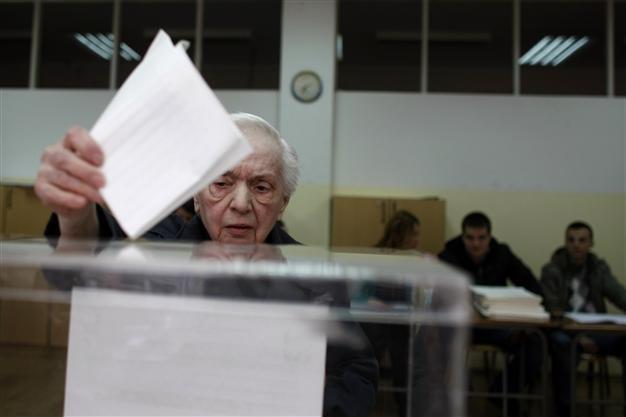Serbia votes in snap polls amid gloomy economy
BELGRADE - Agence France-Presse

A woman casts her ballot for the parliamentary elections at a polling station in Belgrade, Serbia, Sunday, March 16, 2014. AP Phot
Serbians began voting in snap elections Sunday, with the ruling Serbian Progressive Party (SNS) tipped to capitalise on a wave of public support after successfully opening EU membership talks.Some 6.7 million voters are eligible to cast their ballots to elect a new 250-seat parliament with a four-year mandate in the early vote called after Belgrade launched talks in January to join the European Union.
Long seen as a pariah for its role in the 1990s Balkan wars, Serbia, the largest country to emerge after the break-up of Yugoslavia, now hopes to join the 28-member bloc by 2020.
The outgoing SNS-dominated government led by Socialist Prime Minister Ivica Dacic won support from Brussels to begin membership talks only after a historic accord with its long-time foe Kosovo last year.
But Kosovo, once the most sensitive issue in Serbia which still refuses to recognise its 2008 declaration of independence, has now been overshadowed by the dire economic situation in the country of 7.2 million people.
The ruling centre-right SNS and its leader Aleksandar Vucic -- an ultra-nationalist hawk turned pro-European -- said a new mandate was needed to push forward with "difficult and extremely painful economic reforms."
Vucic, who voted early along with his daughter, said his party "set his goals high."
"I want Serbia to pursue a fierce battle against corruption, develop its economy, increase the number of jobs and for this we need difficult and painful reforms," Vucic said.
"It will not be easy at all, thousands of other problems must also be solved," Vucic told reporters.
A fifth of Serbia's workforce is unemployed and the average monthly salary is 350 euros ($480).
Many, like 45-year old textile worker Jadranka Milosavljevic, moonlight in so-called grey economy sector, with no health or social benefits.
"Ordinary people will see no change. Look at me, it's Sunday, and I'm on my way to my second job, to try to make some money for my family," she said.
With public debt rising to more than 60 percent of GDP, the future government will have to reform obsolete labour laws and cut down on burgeoning bureaucracy, experts say.
Serbia's eight-billion-euro budget ($11 billion) struggles to deal with some 1.7 million pensioners and a bloated public sector that employs more than 700,000 people.
The future government will have to push through a stringent austerity package, including the privatisation of more than 170 state-owned companies, subsidy cuts and tax increases in a bid to reduce spending and get people back to work.
But 64-year pensioner Borivoje Mikic said he expected no change after the polls.
"We bear the brunt of everything. The barn is the same, only the animals in it change," Mikic told AFP after casting his ballot.
Vucic, tipped to become prime minister, has spearheaded his party's gain in popularity thanks to a high-profile anti-graft drive which has led to the arrest of several tycoons and former ministers.
Despite the gloomy economy, the SNS is riding high in the polls with 44 percent of voter support.
Olga Petrovic, 52, unemployed bank clerk, said Vucic and his party have offered her "the first glimmer of hope." "I know we will have to survive painful times, but at least I see a light at the end of a tunnel," Petrovic said.
But 68-year old Bojan Popovic, retired engineer, said he had voted for the opposition "for a change."
"The government has so far been only advertising its moves, the arrests of tycoons, criminals, that's all fine, but we haven't seen any results," he said.
The Socialists, who joined forces with the SNS after elections in May 2012, are polling second with around 14 percent.
The opposition Democratic Party is trailing behind with around 11 percent.
The Democrats, failing to find common ground with other opposition parties to fight the SNS, have set their sights on winning back control of Belgrade city hall in municipal polls held on the same day.
Polling stations will close at 1900 GMT with hundreds of international and local observers monitoring the vote.
Preliminary results are expected early Monday, with final results due by March 20.
















